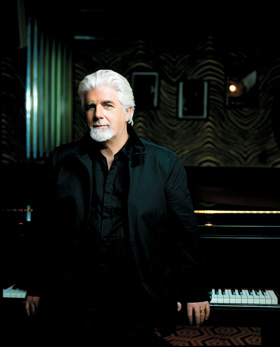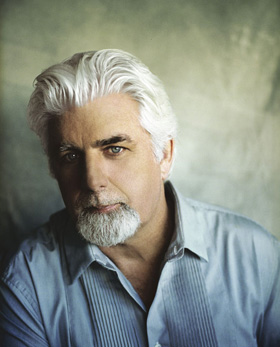Al Green Michael McDonald ‘10 Tour
MICHAEL MCDONALD BIOGRAPHY
“You just try to pick the songs that are most meaningful to you,” says five time Grammy-winner Michael McDonald about the inspiration for his new album, Soul Speak. “These songs span my life - they’re the ones where I can remember where I was when I first heard them, the ones that made me interested in becoming a recording artist, the songs I’d always imagined myself singing.”
Soul Speak is the natural follow-up to McDonald’s two smash explorations of the Motown Records songbook -the platinum-selling Motown from 2003 - which was nominated for two Grammy awards, and the next year’s gold-selling Motown Two. But this time, McDonald didn’t restrict himself to any one style or record label or decade; he wanted to interpret songs that he loved, regardless of genre.
So while some of the selections - “For Once in My Life,” “Walk on By,” or the album’s first single, “Love TKO” -fall squarely within the blue-eyed soul territory that we associate with Michael McDonald, others, like Leonard Cohen’s “Hallelujah” or Van Morrison’s “Into the Mystic,” are a bit more surprising.
The creator of such hits as “I Keep Forgettin’,” the Grammy-winning “Yah Mo B There,” and the Number One pop single “On My Own,” McDonald isn’t afraid to challenge expectations.. “Everybody always wants you to keep doing what you did last time,” he says. “You’re always met with, ‘Oh, you don’t want to do that, you’ll lose your fan base.’ But I’ve found that whenever I got back on the radio, it was with something completely different than what I’d done before.”
Besides, he adds, his own responsibility to a song doesn’t change just because its sound does. “I approach them all the same way - can I find that place in me where I feel I’m being sincere with the song?”
McDonald, 56, has been a fixture in American pop music for over three decades. After emerging out of the local scene in his hometown of St. Louis, he first came into the spotlight as part of Steely Dan’s touring band in the early 1970s. He contributed vocals and keyboards to the band’s classic albums Katy Lied, The Royal Scam, Aja, and Gaucho. While working with Steely Dan, McDonald also joined the Doobie Brothers, where his voice became the group’s focal point on such songs as “Takin’ It to the Streets,” “Minute by Minute,” and, unforgettably, the Number One single “What a Fool Believes,” which won the 1980 Grammy as Song of the Year.
McDonald’s distinctive, instantly recognizable voice may be his signature, but on Soul Speak, he wanted to push himself to match the songs rather than the other way around. “A lot of these songs call on me to step up to the plate as a vocalist even more than the songs I write,” he says. “But if I’m going to do a record that’s well known, I won’t lower the key. That’s part of the ingredients of respecting the original - whether it’s in the most comfortable key for me or not.”
That same traditional philosophy determined the way in which Soul Speak was recorded. “On the Motown records,” says McDonald, “we built the tracks on computers and then brought in the musicians. This time was really more old-school, done live in a couple of takes. Other than things like the horns, the tracks were done pretty much as you hear ‘em.”
This approach allowed McDonald to try out many more songs than he was able to use, and to be more spontaneous in the studio. For instance, he was working on a version of “Hallelujah” for a Leonard Cohen tribute concert at UCLA. “I came up with something a little different, a little more blues/R&B version,” he says. “Fifteen minutes before the session, we made the decision to try to cut it. Those are the moments that make recording a really rewarding experience.”
The selection on Soul Speak that may be most special to McDonald, and which he confesses intimidated him the most, is “Redemption Song,” with its simple folk melody and classic Bob Marley lyric. “I love the song, but it’s so personal to Bob Marley, to a culture, I thought, how do I sing this lyric? Is it presumptuous?,” he says. “But I think it says so much about what all the other songs are about, looking for redemption in a person or a place, and staying humane in the process. That lyric just says it as it is - that there’s victory out there, but it’s never going to come in the form or the time you expect it to.”
Soul Speak also includes three original songs by McDonald, a reminder that he has a significant history as a writer as well as an interpreter. “We actually went back and forth choosing the originals,” he says. “‘Only God Can Help Me Now’ and ‘Getting Over You’ are kind of retro feeling, so they fit pretty easily. ‘Enemy Within’ stands on its own, but (producer Simon Climie) thought it added a little bit of a turn that the album needed, so it wasn’t just a collection of oldies.”
McDonald expects that his next project will be more focused on his own songwriting, but notes that his busy touring schedule makes it difficult. “More and more, if I’m not careful, I find that I’m out working all the time and I have to search for any time to be able to woodshed and write.”
The key to a project like Soul Speak is that even if most of these songs weren’t written in Michael McDonald’s own words that doesn’t make them any less personal. The album is the story of a musical life, of the thoughts and sounds and influences that helped shape a legendary career. Not that these fourteen songs are the beginning and end of that tale.
“The only frustrating thing,” says McDonald, “is that the deeper into the list of songs you go, the more you realize that it’s inexhaustible. The more you think about it, it just seems to get longer, and the more impossible it becomes.”
Al Green - Official Website:
www.algreen.com
Michael McDonald - Official Website:
www.michaelmcdonald.com
Al Green Images By Christian Lantry
|
|

|

Bellowhead |
LATEST GALLERY IMAGES

The Evil of Netanyahu 
Snow Patrol 2025 |
|
|



